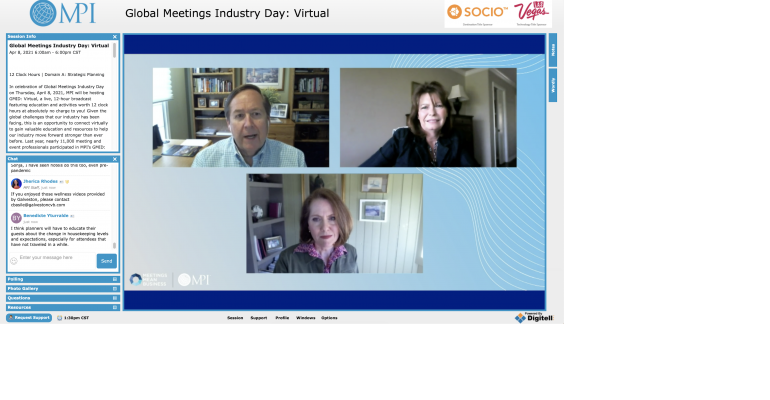On Thursday, April 8, Global Meetings Industry Day featured several in-person and virtual events that highlighted the importance of the meeting, incentive, convention, and trade-show industry, while also educating planners on the new landscape they will operate in going forward.
In a virtual session run by Meeting Professionals International titled “Dynamics of the Hotel Sales Structure: What Planners Should Know,” hoteliers noted some of the biggest changes in how they will interact with their planner clients for the foreseeable future—and perhaps forever.
First, Kaaren Hamilton, CMP, vice president of global sales for Red Lion Hotels Corp., said that “it is incumbent on us to keep planners informed of all the changes we’ve made to our sales organizations” since last March. In that time, “we saw lots of property salespeople and directors of sales get furloughed or let go, and even some people in regional sales offices.” At Red Lion, “we partnered with an outsourced sales organization in mid-2020 to keep things going with the many small meetings we host, and we probably won’t see that set-up going away.”
Teresa White, senior director of global sales for Wyndham Hotels & Resorts, said that while her firm’s properties “are starting to staff up in sales again, videoconferencing allowed us to maintain regular contact with planners throughout, and that [practice] is going to continue.” In fact, “reps are actually much more involved in client conversations about objectives” and other higher-level considerations than before, added Hamilton. “There’s been more transparency shown in the communications during the pandemic environment,” which she says will shape the planner-hotelier relationship from now on.
Especially because “the pace of meeting bookings has picked up tremendously since late March for events anywhere between Q3 2021 and early 2023, planners need to be transparent with us about the flexibility they have with their event dates,” noted White. Between the postponed meetings of the past year and new business competing for space, “we are definitely playing a real-life game of Tetris, and fitting everyone in is going to be tough,” said Hamilton. To make it work, “the concept of shared responsibility is very important. The planner must be part of the process of mitigating risk for the hotel in terms of that event actualizing. We need constant communication and flexibility between both sides to achieve this.”
Another area requiring flexibility and constant communication: service levels. “Hotels are in the middle of trying to align their service levels correctly, and planners have every right to dive deeply into that during contract negotiations,” said Red Lion’s Hamilton. White from Wyndham added that “planners should not assume anything—ask questions that you might never have asked before about how staff levels, social-distancing rules, and other factors will affect the room-set changeover process, the food-and-beverage delivery process, and other meeting elements.”
Lastly, planners should know that hotel companies are looking not only to former industry workers but also to job fairs and colleges to round out their staffs in the post-pandemic environment. This will require more training to bring employees up to speed on servicing not just the business elements of meetings, but also the guest-experience side. “To manage planners’ and guests’ expectations right now,” said Hamilton, “we have to make sure to communicate things such as the fact that we probably won’t be cleaning guest rooms every day.”





